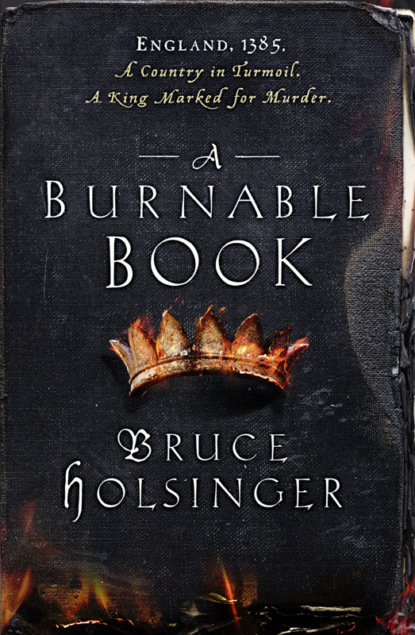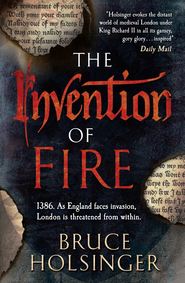По всем вопросам обращайтесь на: info@litportal.ru
(©) 2003-2024.
✖
A Burnable Book
Автор
Год написания книги
2019
Настройки чтения
Размер шрифта
Высота строк
Поля
‘A street vagrant, then?’
‘Nay!’
‘How about – how about a friar?’
‘The friar! The friar!’
FitzWilliams shook his head, shining an exaggerated sadness around the great hall. ‘Incorrect, gentlemen of the bar, the killer is not a friar!’
General laughter, and as it crested, then ebbed, I noticed a small stir from afar, rendered peculiar only by its timing. In the hall’s north corner Chaucer rose from his seat, nodded an apology to his benchmates, and ducked through the low doorway leading to the buttery. As the door closed to on his back FitzWilliams adopted a more serious look. ‘Our alleged murderer is not a priest, nor a bishop, nor a cardinal. He is neither a cooper nor a cordwainer, neither a mercer nor a shipwright, neither a pinner nor a—’
‘Let’s just have it, then, Fitzy!’ someone shouted from the back.
FitzWilliams looked up, affecting offence. More titters. I sat forward, confused by Chaucer’s departure at the height of the apprentice’s spectacle. With a flourish, FitzWilliams gazed across the crowd. ‘Have it we shall. Our murderer is, rather, a p—’
‘Huzzah! Huzzah! Huzzah!’
Loud shouts, drowning out FitzWilliams’s revelation with the force of a gale. The serjeants-at-law, twenty strong and with Thomas Pinchbeak hobbling in the lead, rushed the pageant wagon as a single dark-robed mass, their gowns spread above their heads like bat wings as they mobbed the players. Three of the younger serjeants climbed on the wheels and proceeded to demolish the set, kicking apart the flimsy rails, ripping the robes from the judges, releasing the accused from his bonds. Two others grappled the ‘victim’ off the side platform and stripped the costume from his flesh, leaving him only in his braies, then sent him into the crowd with a jar of wine over his head.
Utter pandemonium: screams of delight and alarm; cups, jars, and flagons flying overhead, to shatter against the walls; serjeants and apprentices alike screaming to the rafters, some enjoying the skirmish, others frightened nearly for their lives; the wagon overturned on the floor, its spoked wheels and siderails broken on impact; the melee thrown in long shadows by hooped candelabra casting pantomimes of disorder against every surface.
Even the wildest revels must end, however, and eventually, as the tumult subsided and the barristers and apprentices surveyed the results, there was a general quieting through the hall, an almost embarrassed assessment of the state of things. I watched and listened to the reactions. Many held that the disruption had been coordinated between the utter barristers and the serjeants, perhaps as a staged commentary on the poor quality of the recent moots. Others avowed that the serjeants saw murder as inappropriate for mooting, and broke the spectacle up accordingly. There were still others who had observed what I had during the lead-up to the interruption: the anger of the serjeants-at-law, the whispered conferrals among England’s most powerful lawmen, the decision taken to rush the players before their moot had even begun.
Yet there was something more that had disturbed me about the spectacle, something I would scarcely admit to myself as I lingered in the great hall. I sat at my bench for a long while, watching the overturned wagon as the space emptied of barristers, of serjeants, of apprentices and guests, until only the servers were left. Around me they swept up broken bits of glass and clay, gathered the leavings of the students’ extravagance into buckets that would now feed pigs, dogs, their children in the tenements. As the hall emptied my certainty deepened, and a tingling of unease began at the bottom of my spine, moved up my back, and settled into my heart as a coiled suspicion.
My memory replayed the course of the abbreviated moot: the introduction of the case, the gaudy spectacle of the victim, Chaucer’s unexplained departure through the kitchen door – and finally, the naming of the accused. In that moment before the serjeants shouted him down, I could swear with a near certainty that one final word had escaped FitzWilliams’s mouth. Our murderer is, rather, a p—
It seemed unlikely in the extreme that the man had suggested such a thing. Yet I had heard it from his lips, was sure of it: the one word that could most have affected me as I took in the lewd spectacle of a young woman’s violent death. Our murderer is, rather, a p—
One word: poet.
Worshipful Sir, and Our Most Intimate Friend,
Your muse finds herself in peril. Upon your return from Rome you will fondle not her supple skin but this rough parchment. Here on the banks of the Arno it will await you, just as my flesh awaits reunion with your own.
Those pleasures must be delayed, for in the morning I leave our Tuscan Eden for the coast. From there I shall arrange passage to that faraway island our histories call Albion, and you call home.
You are a lover of stories. Stories of love, lust, and loss. Of wars, rivalry, and revenge. Of the commonplace and the unlikely. The story I must now tell you is woven of all these threads, and more besides.
You know its characters, some better than others, though you cannot know, as I do, the depths of their perfidy and the heights of their nobility. Even to commit this tale to writing is to subject you, its reader, to the same peril that stalks me now. For Hawkwood’s talons are sharp, his vision is keen, and his enemies tend to die young.
I can delay no longer. Time is short, and there is much to relate.
Here, my only heart, is the story.
Once, along the Castilian marches, beyond the Crown of Aragon, there lived a knight. Not a great knight; no one would have mistaken him for a Lancelot, a Gawain, a Roland, though where he fell short of these famed knights in ferocity, he matched every one of them in honour. To his lord he was a model of duty. To his own men he was the very mirror of chivalry: swift of sword, moderate in judgment. Toward his people he acted fairly and wisely in all things.
Our knight kept a castle. Not a great castle; no one would have mistaken it for the alcázar of Pedro the Cruel, nor for Avignon’s papal palace, nor England’s palace of Westminster. Yet its walls of broad stone and heavy mortar kept our marcher lord well defended from the occasional marauder.
Our knight had a wife. A beautiful wife indeed, so beautiful one might well have mistaken her for Helen, or Guinevere, or for the Laura of Petrarco. She was the daughter of a minor count of questionable lineage. A family of Moorish blood, not a few whispered, keeping the faith of Mahound while miming love of the Cross. Yet as the knight was trusted by his people, such whisperings were soon quieted, his small, dark wonder of a wife accepted into the circles of Castilian ladies gathered on occasion at court.
Soon a daughter arrived. She was, like her mother, dark and small. She captivated her parents. The knight, of course, wanted a son. The wife was still young, and though the years went by with no further issue, there was little doubt that God would someday reward them.
It came to pass, when the daughter was approaching her seventh year, that the knight was summoned by his lord to battle. Not a minor border skirmish, but a major campaign in a larger war that threatened to conscript every able-bodied man from the Pyrenees to the port of Cádiz. You will know of this war: of Pedro the Cruel and Enrique de Trastámara, of brothers divided against themselves. When Pedro called, our knight gathered the might of his men, leaving only a small garrison behind.
Word soon came of a bloody battle in Nájera, a battle in which King Pedro won back the crown of Castile from his bastard brother. Though this victory was to be short-lived, the tidings brought considerable joy to the castle and town, despite the additional news that the lord’s return would be delayed many months as King Pedro led his army to further battles against the lingering enemies of the crown. In her knight’s long absence the lady saw to the needs of his property and people, with an added touch of feminine grace that delighted those around her.
On the Day of St Dominic, as the lady and her daughter strolled in the castle’s herb garden, the scents of rosemary and lavender mingling in the hot calm of an August afternoon, a blotch on the northern hills caught the little girl’s eye. She squinted against the sun.
Dust, yet not from a storm. The road from Burgos was dry, and any single horse would kick up a mass of saffron powder that might linger for hours.
The cloud she saw now filled the horizon. Forty horses, perhaps fifty. She tugged at her mother’s dress. They gazed together at the approaching force, their hearts lifting against a darkening sky.
The Day of St Dominic. The day the strangers came.
EIGHT (#ulink_e09df8fa-a23e-5cb1-899d-d9d46613d4aa)
Rose Alley, Southwark
The Pricking Bishop. Edgar Rykener shook his head at the painted sign, amazed that the Bishop of Winchester allowed such pictures in his liberties. Lord Protector of Whores, they called him up on Gropecunt Lane, defending his right to run as many houses as he pleased across the river in Southwark while the hard-working maudlyns of London got constantly harassed by the law. Joan Rugg would go on about it for half a day. Unlike Gropecunt Lane, the stews of Southwark embraced their natural filth, the half-pipe gutters stopped up with brackish water of a murky green, the conduits to the river long forgotten by the bishop’s underworked ditchers. Wobbly shacks had been built out into the streets to claim space for shops, while the oblong fishponds at the western end walled off the great houses on the riverbanks beyond. No sweepers or rakers to maintain the streets, nor regular dung carts to haul away the most offensive waste.
On the Bishop’s front steps sat a withered old maudlyn, barely there beneath her shift and smock. St Cath was her name, Edgar recalled, still alive after half a century on her back. A dozen cats wandered in and out of the half-opened door, pressing against St Cath’s side or darting past while she ignored them.
‘Is Bess about?’ Edgar asked her. The old woman said nothing. ‘Bess Waller, be she about?’
St Cath shifted against the step. ‘Bess Waller,’ she said, as if speaking the name of a stranger. Her face, crossed by a thousand lines, registered no emotion.
Edgar tapped his foot.
St Cath spat. ‘The matter of it?’
‘Not your concern.’
‘Nor be Bess Waller none of yours.’
Edgar stood on his toes and peered into the doorway.
‘Not a peek more,’ said the woman, pushing away one of the cats and struggling to stand, ‘but you proffer your pennies like the fine gentlemen of the parish.’
He snorted. ‘For the love of St Thomas, woman, all I’m about here is looking out for Bess’s daughter.’
‘Millicent?’ she said quickly. ‘Hunting Millicent Fonteyn in the stews?’ St Cath shook her bent frame and wheezed, wagged her small head. ‘Won’t find that knight’s trull in Southwark. Best look up Cornhull for Millicent. Duchess Millicent by now, for all we knows over here.’
Edgar thought over the woman’s response. Something about it didn’t sit right. ‘It’s not Millicent I’m about. It’s Agnes.’
‘Agnes?’
Not this again. ‘Yes, Agnes, you withered hag, sometime maud of the Bishop. Is Agnes Fonteyn about, or’d your witchcraft turn her into one of these cats?’






